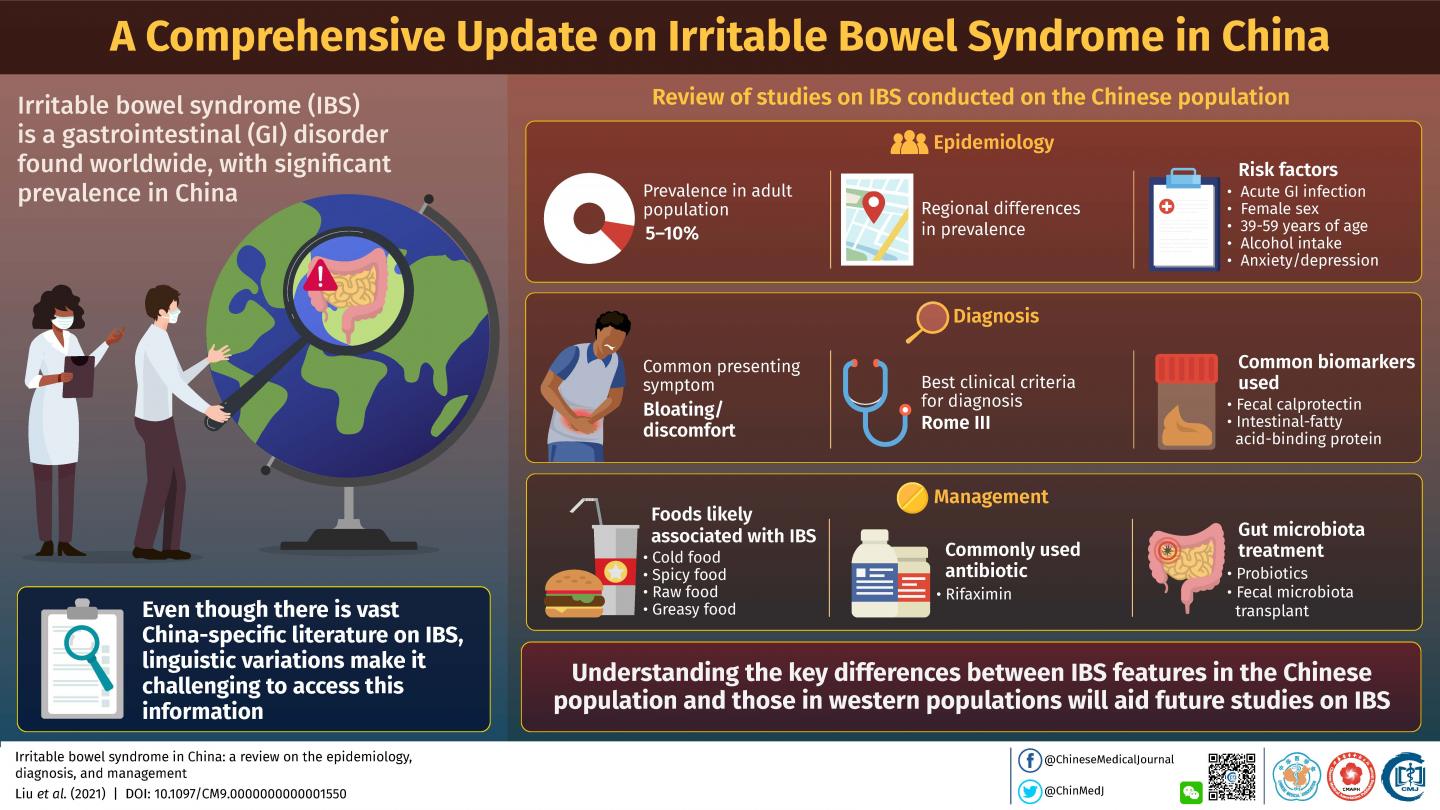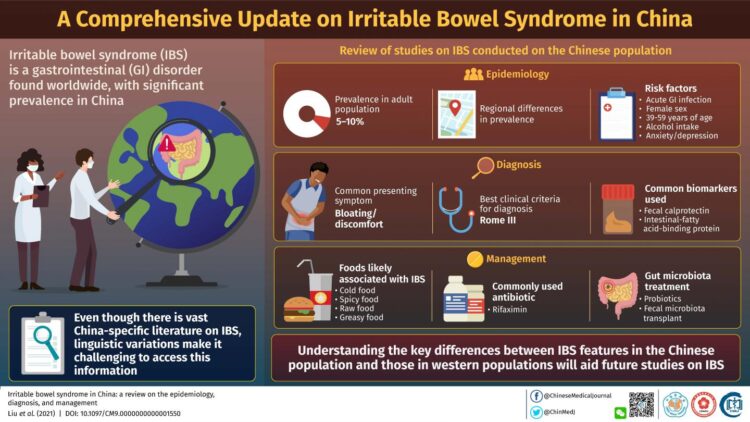Scientists condense Chinese studies over the past decade on this common gastrointestinal disorder in a review article

Credit: Chinese Medical Journal
Irritable bowel syndrome (IBS) is, unfortunately, a common gastrointestinal disorder. Affecting between 10 to 15% of the global population, IBS negatively impacts the lives of those who have it by frequently causing a variety of symptoms, including abdominal pain, bloating, and bouts of diarrhea or constipation. Despite the high worldwide prevalence of IBS, gastroenterologists still haven’t pinpointed its causes, as there seems to be no obvious structural or biochemical abnormalities associated with the disorder. In a similar vein, there is still much debate on effective diagnostic criteria and treatment options.
Considering it has been hard for scientists and doctors to reach a consensus on best practices regarding IBS, it’s important that all the latest information that has been gathered on this disorder is made available in a practical format. That’s why a pair of Chinese scientists recently published a review article in the Chinese Medical Journal summarizing the findings of IBS studies carried out in China. This review was made available online on June 1, 2021 and was published in Volume 134 Issue 12 of the journal on June 20, 2021.
This work addresses a particular gap in the global literature on IBS, as main-author Dr. Jin-Song Lui from Huazhong Science and Technology University, China, explains: “Though China has the largest IBS-afflicted population, IBS studies in China are not well known worldwide because most publications are in the Chinese language. Therefore, we found it necessary to review and introduce the Chinese literature to a wider audience to promote the research and management of IBS.” The researchers collected post-2010 articles published on IBS in China and condensed them into a review covering three distinct aspects: epidemiology, diagnosis, and management.
The epidemiology section summarizes the findings of studies on how IBS affects subpopulations differently. In China, according to a previous review, the global prevalence of the disorder ranges from 5 to 10% depending on the diagnostic criteria used. However, current studies have updated their criteria according to more recent western guidelines, throwing results revealing that, for example, prevalence can be as high as 33% among young adults. Several risks factors are recognized in Chinese literature on IBS, including acute gastrointestinal infection, alcohol intake, being female, and anxiety or depression. In addition, adults 39 to 59 years old seem to be at greater risk. Remarkably, notorious regional differences were found in the prevalence of IBS within China.
As for diagnosis, the so-called Rome criteria are the most commonly used. These criteria are of western origin and have been modified four times, with Rome III and Rome IV criteria being the most used today. According to Chinese experts, Rome III criteria are more appropriate to diagnose IBS in China because Rome IV criteria are more restrictive in their definitions, requiring there to be abdominal pain instead of only discomfort to even consider the presence of the disorder. The review article also covers other gastrointestinal diseases that have overlapping symptoms with IBS, as well the most commonly investigated biomarkers to diagnose and manage IBS. On this last point, the authors highlight fecal calprotectin, blood erythrocyte sedimentation, small intestinal bacterial overgrowth, and blood levels of intestinal fatty acid-binding proteins as promising biomarkers. Still, more research is needed to validate their use both clinically and scientifically.
In terms of IBS management in China, a variety of strategies have been studied. Certain types of foods have been found to be associated with the disorder; mainly cold foods, spicy foods, raw foods, greasy foods, and dairy products excluding yogurt. Further studies should help clarify what type of diet would be best suited to combat IBS or alleviate symptoms. The review article goes over various types of treatments and their success so far. The antibiotic rifaximin is the most used because gastrointestinal infections play an important role in diarrhea-predominant IBS, which is the most common among Chinese patients. There is some limited evidence hinting at the potential of certain antispasmodics and secretagogues (substances that promote secretions), whereas treatment with probiotics or fecal microbiota transplants have been particularly effective in improving symptoms without adverse effects. Finally, ‘tongxieyaofang,’ a plant-based traditional Chinese medicine, has also shown potential as effective treatment in a few studies.
Overall, this review will help Chinese IBS studies reach a wider audience, which in turn shall contribute to the development of better practices. “Our article will enable scientists to cross reference Chinese findings on IBS with those published worldwide. We hope this will inspire future research in IBS,” concludes Dr. Lui.
###
Reference
Titles of original papers: Irritable bowel syndrome in China: a review on the epidemiology, diagnosis and management
Journal: Chinese Medical Journal
DOI: https:/
Media Contact
Peifang Wei
[email protected]
Related Journal Article
http://dx.





